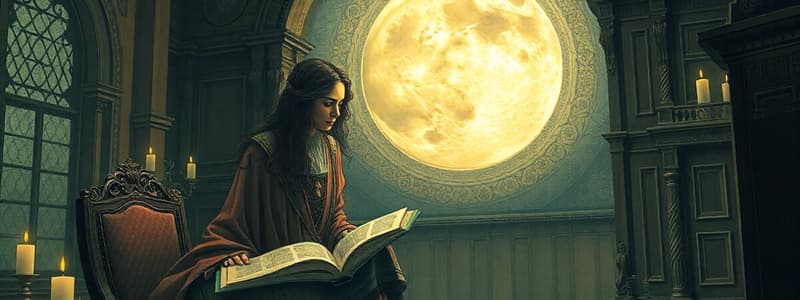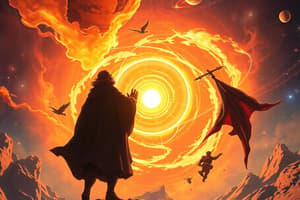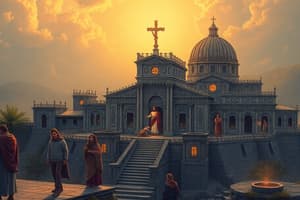Podcast
Questions and Answers
What model of the universe did Galileo support that contradicted the Church's doctrine?
What model of the universe did Galileo support that contradicted the Church's doctrine?
- Cosmic expansion theory
- Heliocentric model (correct)
- Geocentric model
- Flat Earth theory
Which of the following themes is prevalent in Life of Galileo?
Which of the following themes is prevalent in Life of Galileo?
- The inevitability of scientific discovery
- The conflict between dogma and inquiry (correct)
- The importance of artistic expression
- The triumph of authoritarianism
What does Galileo's eventual recantation represent in the context of the play?
What does Galileo's eventual recantation represent in the context of the play?
- A victory for science over authority
- The collapse of scientific inquiry
- The power of moral conviction
- The tension between intellectual freedom and institutional power (correct)
What type of evidence did Galileo use to challenge the Church's beliefs?
What type of evidence did Galileo use to challenge the Church's beliefs?
Which aspect of the Church's response to Galileo's findings is highlighted in the play?
Which aspect of the Church's response to Galileo's findings is highlighted in the play?
What was Galileo secretly working on even after his public recantation?
What was Galileo secretly working on even after his public recantation?
How is the theme of intellectual responsibility depicted in Life of Galileo?
How is the theme of intellectual responsibility depicted in Life of Galileo?
What does the play suggest about the relationship between power and truth?
What does the play suggest about the relationship between power and truth?
What does Galileo's recantation highlight about his character?
What does Galileo's recantation highlight about his character?
How does the Church's suppression of Galileo's findings reflect its relationship with power?
How does the Church's suppression of Galileo's findings reflect its relationship with power?
What is suggested about Galileo's character through his confrontations with the Church?
What is suggested about Galileo's character through his confrontations with the Church?
What role does the telescope play in the themes surrounding Galileo's discoveries?
What role does the telescope play in the themes surrounding Galileo's discoveries?
How does Brecht's portrayal of the Church highlight its role as an antagonist to science?
How does Brecht's portrayal of the Church highlight its role as an antagonist to science?
What moral questions does Galileo's choice to recant raise?
What moral questions does Galileo's choice to recant raise?
What is one consequence of the Church's refusal to accept Galileo's findings?
What is one consequence of the Church's refusal to accept Galileo's findings?
Which theme is emphasized through the relationship between Galileo and institutional authority?
Which theme is emphasized through the relationship between Galileo and institutional authority?
What aspect of Galileo's character is portrayed through his secret continuation of work after recantation?
What aspect of Galileo's character is portrayed through his secret continuation of work after recantation?
What critical viewpoint does Brecht suggest through the characters' perceptions of Galileo’s recantation?
What critical viewpoint does Brecht suggest through the characters' perceptions of Galileo’s recantation?
Flashcards
Galileo's Conflict
Galileo's Conflict
The play explores the clash between scientific discovery and religious authority
Heliocentric Model
Heliocentric Model
The idea that the Earth revolves around the Sun
Church's Authority
Church's Authority
The Church's power and influence in shaping beliefs
Empirical Evidence
Empirical Evidence
Signup and view all the flashcards
Intellectual Responsibility
Intellectual Responsibility
Signup and view all the flashcards
Recantation
Recantation
Signup and view all the flashcards
Truth vs. Ideology
Truth vs. Ideology
Signup and view all the flashcards
Scientific Progress
Scientific Progress
Signup and view all the flashcards
Public vs. Private Truth
Public vs. Private Truth
Signup and view all the flashcards
Galileo's Obsession
Galileo's Obsession
Signup and view all the flashcards
Galileo's Pragmatism
Galileo's Pragmatism
Signup and view all the flashcards
Church's Fear of Power Loss
Church's Fear of Power Loss
Signup and view all the flashcards
Role of Evidence
Role of Evidence
Signup and view all the flashcards
Galileo's Character
Galileo's Character
Signup and view all the flashcards
Science and Power
Science and Power
Signup and view all the flashcards
Institutional Resistance
Institutional Resistance
Signup and view all the flashcards
Moral Responsibility of Scientist
Moral Responsibility of Scientist
Signup and view all the flashcards
Transformative Power of Technology
Transformative Power of Technology
Signup and view all the flashcards
Study Notes
Life of Galileo Study Notes
-
Brecht's Life of Galileo is a historical drama exploring the conflict between science (specifically, the Copernican model) and religious authority (the Catholic Church) in the 17th century.
-
The play depicts Galileo's life, focusing on his discoveries, challenges with the Church, recantation under threat, and later house arrest.
-
Despite the recantation, Galileo continues scientific work, secretly publishing Discorsi.
Major Themes
-
Church and Science:
- The Church represents authority and dogma, while Galileo represents the pursuit of truth through reason.
- The play critiques the Church's stifling of scientific progress out of fear of losing control.
- The play illustrates the tension between intellectual freedom and institutional power. The Church maintains order through suppression of scientific progress; prioritizing order over the pursuit of truth.
-
Role of Evidence:
- Galileo's telescope observations (moons of Jupiter, phases of Venus) provide evidence for the heliocentric model— challenging existing models.
- The Church resists accepting this evidence due to its threat to established beliefs.
- The play highlights the tension between public and private truth, how institutions often block revolutionary ideas.
-
Galileo's Character:
- Galileo is presented as a complex character.
- His relentless pursuit of knowledge is portrayed as both obsessive and pragmatic. The risk he takes for science reveals his commitment, but his recantation reflects a prioritization of survival.
- Brecht examines Galileo’s moral compromises, challenging audiences to assess the balance between survival and upholding truth. The play questions whether his recantation represents a betrayal of his values, or a calculated survival tactic.
Key Themes and Questions
- How does Brecht depict the Church's motivations for suppressing Galileo's work?
- What is the significance of their insistence on maintaining public ignorance about scientific advancement?
- How does the play depict the conflict between relying on evidence and adhering to authority imposed by an institution?
- Does Galileo, as a character, appear more as a hero, a pragmatist, or a coward?
- What does his choice to recant reflect about the moral responsibilities of scientists in society?
Critical Analysis
- Brecht's play is a critique of institutional power that opposes progress. This extends to any institution refusing scientific advancement.
- Galileo's use of the telescope represents how technology reveals new truths but often faces significant opposition from institutions.
- The play challenges the audience to evaluate Galileo's actions.
Conclusion
- Life of Galileo examines the conflict between truth and authority, the importance of evidence, and the complexities of human choices when faced with ethical challenges.
- The play's themes remain relevant in modern contexts, highlighting the ongoing tension between scientific progress and societal ideologies.
Studying That Suits You
Use AI to generate personalized quizzes and flashcards to suit your learning preferences.




